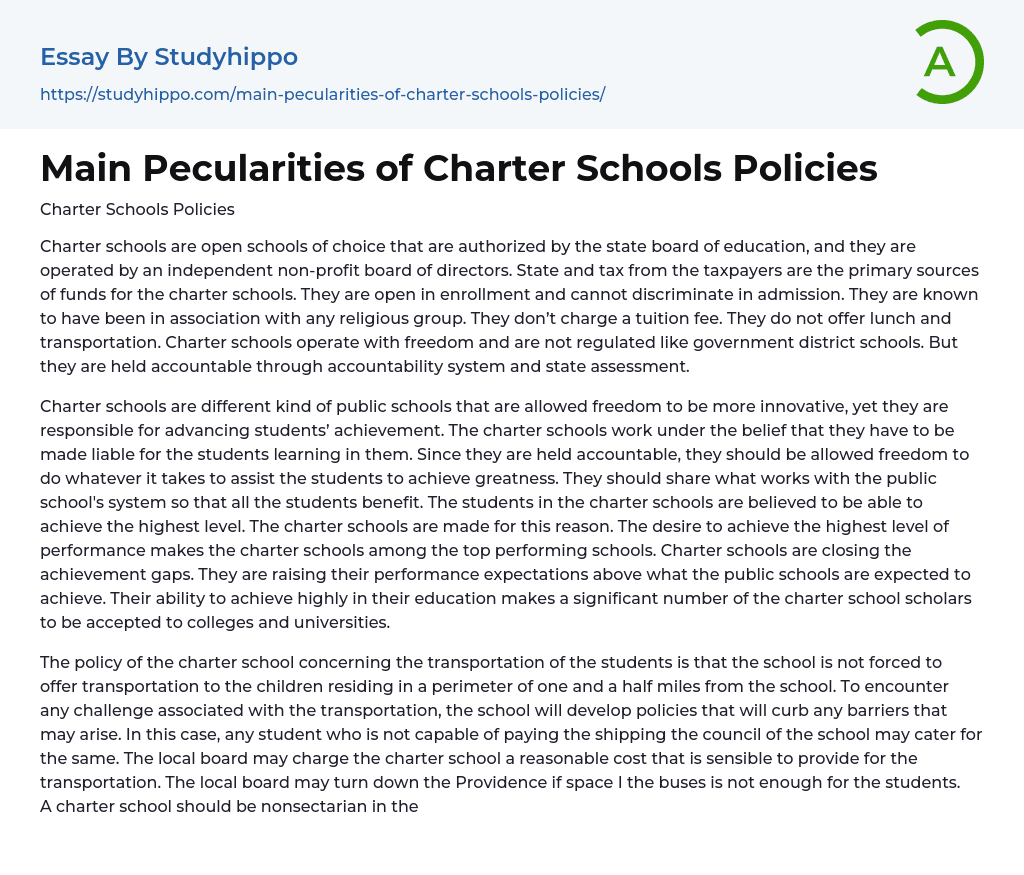

Main Pecularities of Charter Schools Policies Essay Example
Charter Schools Policies
Charter schools are educational institutions that offer students choices and are authorized by the state board of education. They are managed by an independent non-profit board of directors and rely on funding from state resources as well as taxpayer contributions.
Charter schools are inclusive and welcome all students to enroll, regardless of any discrimination. They are not affiliated with any particular religion and do not require payment for enrollment. However, unlike government district schools, charter schools do not provide lunch or transportation services. Furthermore, charter schools function independently without stringent regulations.
Charter schools, while publicly funded, have greater flexibility in being innovative compared to traditional public schools. Yet, they are still required to ensure student progress through an accountability system and state assessment. These schools acknowledge the significance of bearing responsibility for students' learning and should
...thus be granted the freedom to employ any necessary approaches to enhance academic success. It is crucial that they share their effective strategies with the public school system for the benefit of all students.
Charter schools aim to assist students in reaching their maximum potential and position themselves as top-performing educational establishments. They strive to reduce achievement disparities by implementing higher performance standards compared to public schools.
Charter school scholars often excel academically and gain admission to higher education institutions. The school's transportation policy stipulates that students residing within one and a half miles of the school are not eligible for transportation services. Nevertheless, the institution is committed to addressing transportation difficulties. Students facing financial constraints can request financial aid from the school council to cover transportation expenses. Additionally, the local board has authority to impose a reasonable fee for transportation
costs. In situations where bus capacity is limited, specific students may be denied transportation based on the discretion of the local board.
Charter schools are required to be fair and objective in their programs and must not demonstrate any favoritism in their admission and other policies. They should not have any connection with a biased nonpublic school or religious organization. Charter schools cannot request payment unless it is allowed under specific situations, such as when the local school administrative unit imposes tuition fees. Furthermore, if a charter school is approved by the board of directors, they can set fees for extracurricular activities. Nevertheless, these fees must not surpass the costs associated with organizing these events.
According to the law regarding charter schools and their facilities, these schools have the freedom to choose their location, as long as they follow zoning regulations. They can rent space from either the local board of education or the local school administration. However, if a biased organization is selected for leasing space, it would result in segregating charter school students from other local students. Additionally, any religious artifacts or symbols displayed in the entrance, classrooms, or halls must be removed from the charter school premises. If a sectarian organization is chosen for leasing space, the name of that group cannot be used for the charter school. The board of education has an obligation to provide necessary space upon request unless they can prove that it is not economically feasible.
The board of education is tasked with supplying charter schools with essential facilities, which the charter schools must then maintain and preserve. If a charter school desires a particular property but faces opposition from
the board, they have the option to appeal to the county commissioner, who holds ultimate authority in this decision. Student discipline is regulated by Article 27 chapter 115c of the general statute, and charter schools are obligated to adhere to these regulations. Should a student fail to comply with these laws, the charter school has the ability to remove them and transfer them to another local administrative unit as outlined in their charter. Ultimately, individuals select charter schools as community institutions.
In the education system, the goal is to attain the highest level of education while also expecting students to exhibit discipline and gratitude towards the community.
- A Doll's House essays
- A Midsummer Night's Dream essays
- A raisin in the sun essays
- A Streetcar Named Desire essays
- An Inspector Calls essays
- Death of a salesman essays
- Everyman essays
- Fences essays
- Hamlet essays
- Hedda Gabler essays
- Iago essays
- King Lear essays
- Macbeth essays
- Much ado about nothing essays
- Oedipus Rex essays
- Oedipus The King essays
- Othello essays
- Pygmalion essays
- Romeo And Juliet essays
- Tartuffe essays
- The glass menagerie essays
- The Importance of Being Earnest essays
- The Merchant Of Venice essays
- The Taming of The Shrew essays
- Twelfth Night essays
- Waiting For Godot essays



